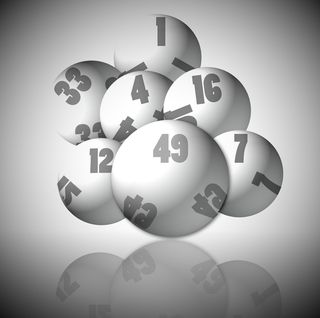Play
The Psychology of Why We Play Lotto
Ways to explain 'irrational' behaviour
Posted December 4, 2016

In the 18th Century a Swiss polymath by the name of Daniel Bernoulli changed the world forever. His work relating to what we now recognize as ‘(expected) utility theory’ essentially taught us how to behave in any given situation where the outcome is uncertain.
It’s hard to conclude that human behavior is rational. Of course this isn’t always the case; from time to time we ‘get it right’, but consistently behaving in the most rational, logical, utility-maximizing way possible is vanishingly rare. All of us invariably fall victim to an array of cognitive biases that hijack (temporarily) our ability to critically evaluate a scenario and offer a considered, logically optimal response.
Let’s imagine you’re at a carnival and someone offers you a gamble that could win you $1,000. The game is simple; you just have to pick a green ball out of a barrel containing a bunch of red balls and only a few green ones. Sounds pretty easy right, and you win $1,000 if you pick a green ball. The problem is that it will cost you $50 to play the game. Should you do it? Well, to answer that question, you really need to know the likelihood of winning; in other words, how many red balls are there and how many green balls are there?
Let’s firstly consider the case (we’ll call it ‘Game 1’) where there are 90 red balls and only 10 green balls. In other words, among every 10 balls there are 9 red and only 1 green. In this example you have a 1 in 10 shot of picking a green ball, or rather, a 10% chance of winning. So on average, you can expect to win 10% of the time. Since each time you win you get $1,000, your expected return on a single game is 10% of $1,000, or $100 (‘chance of winning’ x ‘prize’). You also need to remember here that it will cost you $50 to play. Clearly your expected return of $100 exceeds your cost of $50, so you should absolutely take the gamble.
Now imagine a similar game (still costing $50 to play) but this time there are 99 red balls and only 1 green ball (we’ll call it ‘Game 2). Using the same logic as in Game 1, you now have a 1 in 100 (or 1%) chance of winning. Again your prize is $1,000 if you win. So your expected return on a single game is now 1% of $1,000, or $10. The equation is similar but becomes: $50 (cost) versus an expected return of $10. As your cost ($50) is more than your expected return ($10) you wouldn’t gamble. Doing so would be irrational.
So play Game 1 but stay away from Game 2.
In a more general sense, the cost of doing something (in this case $50) should be weighed against what outcome you can expect by doing it (in this case, the payout of $1,000 multiplied by the chance of it occurring, here either 10% or 1%). When the cost is more than the expected return, don’t do it. When the cost is less, do it.
The math is relatively straightforward when the cost, reward, and probability are known exactly, but life decisions are very rarely this precise.
Playing the lottery is a great example here. Most people that play have at least some kind of intuitive understanding that they are probably not going to hit the jackpot.
Knowing the exact probability of a given outcome would seem to be fairly important. After all, life really is all about probabilities.
Let’s take the Oz Lotto in Australia. I’m going to try and be generous and over/under estimate everything in favour of the punter. The cost to play is a bit over $1. The odds of winning first division are a bit less than 1 in 45,000,000. On November 22, 2016, the division 1 prize was just over 2,100,000 (but we’ll say it was 2.2 million). So our cost is $1, and our expected return is (2,200,000 * 1/45,000,000). In other words $1 versus a bit under 5 cents. So for every $1 you are putting in, you can expect to get about 5 cents back.
However, to be fair there are 7 divisions in Oz Lotto. Instead of scoring 2.2 million, you may get a lesser prize of ~$45,000, ~$6,000, ~$400, ~$60, ~$30, or ~$17. So now we have to weight each of these by their chance of occurring, and sum the values. I’ll spare you the math but essentially now we have a proposition of ~$1 (cost) versus an expected return of ~50 cents. Clearly this is far more respectable, but still a long way from equitable.
But this doesn’t even really matter. After a point, even maths loses its utility. I could tell you that the odds of winning Oz Lotto are far better than the odds of winning either the EuroJackpot (1 in 95 million), the EuroMillions (1 in 140 million), the US MegaMillions (1 in 260 million), or the US Powerball (1 in 292 million), but it won’t really matter.
You’ve probably heard that you are far more likely to die on the way to buying your lottery ticket than you are to actually win the lotto (some estimates of the chances of dying in a car accident are as alarmingly high as 1 in 6,700), but even if you aren’t driving, there’s always the chance that you’ll:
- Be crushed by a falling vending machine (1 in 112 million)
- Get attacked by a shark (1 in 12 million)
- Be stung to death by a bee, hornet, or wasp (1 in 6.1 million)
- Plummet to your death in a plane (1 in 1 million)
- Be killed by flesh-eating bacteria (1 in 1 million)
- Drown in a bathtub (1 in 840,000)
- Have to visit the ER for a pogo-stick related injury (1 in 115,000)
But it’s not all doom and gloom, you are also more likely to:
- Become the president of the United States (1 in 10 million)
- Win an Olympic gold medal (1 in 662,000)
- Win an Oscar (1 in 11,500)
- Find out your child is a genius (1 in 250)
- Live to 100 (1 in 3)
The bottom line here is that winning lotto is very unlikely. So the question has to be asked: “Why is it so popular?” If people know that something is very unlikely to occur, and it costs them to see if it will, why would they do it? Well, there are several reasons – many of them rooted in psychology. In no particular order here are 6 of the more common.
1. Near misses
Across, just about any domain, there is a strange allure of almost winning. The near-miss effect describes a very special kind of failure to reach a goal. The player making the attempt comes close to, but falls just short of hitting their goal. In skill-based games like soccer or basketball a near miss gives players useful feedback and a type of implicit encouragement (“you were so close, try again”) that has the effect of giving the player hope for success in future trials.
Lottery players who come close (maybe they get 3 or 4 numbers out of 6 right – the odds of this are generally less than 1 in 1,000) take this as a ‘sign’ that they should keep playing, and they often do. A 2009 paper found that near misses activate the exact same reward systems in the brain as actual successes!
2. The numbers are too big
Our brains haven’t evolved to understand big numbers. Robert Williams, Professor of gambling studies at the University of Lethbridge, Alberta, suggests that although humans have evolved some appreciation for numbers (we can easily comprehend the difference between being chased by 1 lion versus 100 lions for instance), we don’t really ‘understand’ big numbers.
We deal with amounts like 6, 24, 120 etc. all the time, but throughout history it’s never really been important to measure out 18 million of something, or count 50 million of something else. Odds of 1 in 200 million don’t seem that different to odds of say 1 in 3 million. In both cases success is really unlikely. Give someone a choice between odds of 1 in 3 and 1 in 200, however, and the difference is really obvious. It’s certainly not that people can’t grasp really big numbers, but they don’t have that much meaning until we stop and think about them.
3. Availability heuristics
Put simply, the availability bias/heuristic relates to the idea that people judge the likelihood of something based roughly on how readily examples of that thing come to mind. Take shark attacks. You can probably think of news stories about when a shark has bitten a swimmer. One reason for this is that this kind of a story is sensational, and will likely be highly reported. How often have you seen the headline “No sharks at the beach today”? The point is, because you can easily bring to mind examples of shark attacks, you might be tempted to conclude that shark attacks are far more common than they actually are. In fact, the chances of being attacked by a shark are somewhere in the neighbourhood of 1 in 12 million.
The groundbreaking work of Kahneman & Tversky in the field of human judgment demonstrated that humans are NOT rational actors.
You hear and read stories about lottery winners all the time. Jackpot winners always make the news but the battlers who have been playing for 20 years without winning are relegated to the annals of obscurity. Based on this, it’s at least reasonable to think that ‘jackpotting’ can’t be that rare. The net effect is that winning seems possible.
4. The gambler’s fallacy & the illusion of control
If you are playing roulette in a casino and ‘red’ has come up on all of the last 20 rolls, is the next number more likely to be red or black? The gambler’s fallacy (also known as the Monte Carlo fallacy) is the mistaken belief that because an outcome hasn’t occurred for a while it is (somehow) ‘due’ to occur. In the above example, committing the gambler’s fallacy would involve betting on black because it has to ‘come up’ in order to balance out the average (since we know that red is as likely to occur as black).
People frequently select lotto numbers based on how often they ‘come up’ (or rather, how long it’s been since they ‘came up’). A lot of people reason that this (somehow) gives them some control (over an entirely random process). This illusion of control is powerful enough to influence how someone thinks and sustain their irrational behavior.
5. The sunk-cost fallacy
This is an extremely pervasive cognitive bias. In the field of economics a sunk-cost is any previous expense which can’t be recovered, e.g. a previous business expenditure on software, education, advertising etc. Because this cost has already occurred and can’t be recovered, it should no longer be factored in to future decisions. This is seldom the case.
The sunk-cost fallacy occurs when you make a decision based on the time and resources that you have already committed. In lotto, people will often persevere with what they sometimes know is economically irrational (buying more lotto tickets) simply because they have already invested so much. It’s not just lotto though, sunk-costs result in irrational decision making all the time.
Imagine you’ve bought tickets to a band that you really want to see, but on the day of the concert you come down with an illness. Even though you’re sick you decide to go anyway because ‘you’ve already paid for the tickets, so it would be a waste if you didn’t go’. Never mind that you’ve lost the money whether you go or not, and going may actually be an unenjoyable experience if you’re sick.
Or how about deciding to stay in a bad relationship because you’ve already put so much into it? Or going to a class that you don’t enjoy week after week simply because you’ve already paid for it? Or continuing to read a bad book or watch a bad movie just because you’re already half-way through?
6. Entertainment
Importantly, there are some people that intuitively realize that although playing lotto holds little or no economic value, it does have entertainment value. While you are unlikely to make a net monetary gain, you can get something else out of it. It would be absolutely ridiculous to assume that everyone is equally motivated by financial rewards and nothing else. People go to the movies, concerts, sports events etc. all the time with absolutely no expectation of financial gain. From a purely economic perspective this behavior may seem difficult to account for. Fortunately, we know that humans are motivated by more than just money, and all kinds of seemingly ‘irrational’ behavior can be explained away fairly easily.
So some lottery punters are seeking the thrill of the possibility of winning. Others are using it as a justification to temporarily fantasize about excessive wealth. For less than the cost of a cup of coffee, one can realistically spend several happy hours imagining ‘what if’. The excitement that one may experience from even having a chance of winning may be enough to justify the cost of a ticket or two.




